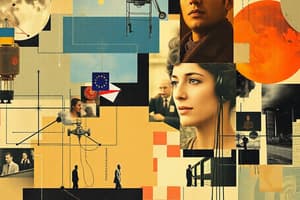Podcast
Questions and Answers
Advanced learning involves the development of ______ thinking and problem-solving abilities.
Advanced learning involves the development of ______ thinking and problem-solving abilities.
critical
Autonomous learning is characterized by taking ownership of one's own ______ process.
Autonomous learning is characterized by taking ownership of one's own ______ process.
learning
The principle of ______ repetition involves reviewing material at increasingly longer intervals.
The principle of ______ repetition involves reviewing material at increasingly longer intervals.
spaced
Active ______ involves actively recalling information from memory rather than simply re-reading.
Active ______ involves actively recalling information from memory rather than simply re-reading.
Breaking down complex information into manageable chunks is known as ______.
Breaking down complex information into manageable chunks is known as ______.
Using associations, acronyms, or other memory aids to facilitate recall is known as ______.
Using associations, acronyms, or other memory aids to facilitate recall is known as ______.
Breaking learning into short, focused sessions is known as ______.
Breaking learning into short, focused sessions is known as ______.
Switching between different types of material or problems to deepen understanding is known as ______.
Switching between different types of material or problems to deepen understanding is known as ______.
Platforms for organizing and tracking learning materials are known as ______.
Platforms for organizing and tracking learning materials are known as ______.
Adaptive systems that adjust to individual learning needs are referred to as ______.
Adaptive systems that adjust to individual learning needs are referred to as ______.
Flashcards are hidden until you start studying
Study Notes
Definition and Concepts
- Advanced learning refers to the process of acquiring complex skills and knowledge beyond the foundations of a subject or field.
- It involves the development of expertise, critical thinking, and problem-solving abilities.
- Advanced learning is often characterized by:
- Autonomous learning: taking ownership of one's learning process
- Self-directed learning: setting goals and managing time effectively
- Meta-learning: reflecting on one's own learning process and adapting strategies
Key Principles
- Spaced repetition: reviewing material at increasingly longer intervals to solidify long-term retention
- Active recall: actively recalling information from memory rather than simply re-reading
- Chunking: breaking down complex information into manageable chunks
- Mnemonics: using associations, acronyms, or other memory aids to facilitate recall
Strategies for Advanced Learning
- Microlearning: breaking learning into short, focused sessions
- Interleaving: switching between different types of material or problems to deepen understanding
- Summarization: summarizing complex information in one's own words
- Self-quizzing: testing oneself on learned material to reinforce understanding
Technologies and Tools
- Learning Management Systems (LMS): platforms for organizing and tracking learning materials
- Artificial Intelligence (AI): adaptive systems that adjust to individual learning needs
- Virtual and Augmented Reality: immersive environments for experiential learning
- Mind mapping and concept mapping: visual tools for organizing and connecting ideas
Advanced Learning
- Involves acquiring complex skills and knowledge beyond the foundations of a subject or field
- Develops expertise, critical thinking, and problem-solving abilities
Characteristics of Advanced Learning
- Autonomous learning: taking ownership of one's learning process
- Self-directed learning: setting goals and managing time effectively
- Meta-learning: reflecting on one's own learning process and adapting strategies
Key Principles for Effective Learning
Spaced Repetition
- Reviewing material at increasingly longer intervals to solidify long-term retention
Active Recall and Chunking
- Actively recalling information from memory rather than simply re-reading
- Breaking down complex information into manageable chunks
Mnemonics and Memory Aids
- Using associations, acronyms, or other memory aids to facilitate recall
Strategies for Advanced Learning
Microlearning
- Breaking learning into short, focused sessions
Interleaving and Summarization
- Switching between different types of material or problems to deepen understanding
- Summarizing complex information in one's own words
Self-Quizzing
- Testing oneself on learned material to reinforce understanding
Technologies and Tools for Advanced Learning
Learning Management Systems (LMS)
- Platforms for organizing and tracking learning materials
Artificial Intelligence (AI) and Immersive Environments
- Adaptive systems that adjust to individual learning needs
- Virtual and Augmented Reality for experiential learning
Visual Tools for Organization and Connection
- Mind mapping and concept mapping for organizing and connecting ideas
Studying That Suits You
Use AI to generate personalized quizzes and flashcards to suit your learning preferences.




